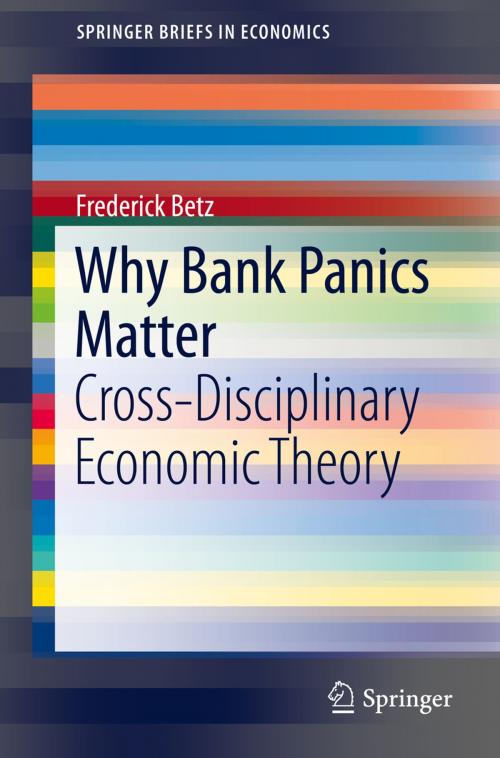Why Bank Panics Matter
Cross-Disciplinary Economic Theory
Business & Finance, Economics, Public Finance, Finance & Investing, Finance| Author: | Frederick Betz | ISBN: | 9783319017570 |
| Publisher: | Springer International Publishing | Publication: | October 17, 2013 |
| Imprint: | Springer | Language: | English |
| Author: | Frederick Betz |
| ISBN: | 9783319017570 |
| Publisher: | Springer International Publishing |
| Publication: | October 17, 2013 |
| Imprint: | Springer |
| Language: | English |
Bank panics have always mattered because they create serious disruptions in economic and financial activity, depressing national economies. But they matter even more now, as information and communications technologies have stitched together a global financial system that is more vulnerable to crisis on a large scale. For example, the global bank panic of 2007-08 froze up the national economies of the U.S., England, France, Iceland, Ireland, and Germany -- all at the same time. And each of their governments had to act to bail out their own banks, without a consistent international regulatory framework.
In this volume, Fred Betz takes a unique, cross-disciplinary approach to understanding bank panics, with an emphasis on the U.S. Bank Panics of 1857, 1907, 1930-33, 2007-08 and the European Bank Panics of 2010-2013. Despite over a hundred years of modern economic theory and many excellent historical studies about bank panics, they are still poorly understood and certainly not yet preventable. Partly this has been a function of the limitations of modern economic theory, which cannot interpret bank panics as complex societal phenomena. All societal phenomena are, in reality, multi-disciplinary in scope and cross-disciplinary in connections. Bank panics can best be understood through the collective lenses of sociology, political science, psychology, management science, management of technology, among other disciplines. Through this dynamic approach, the author identifies five key underlying triggers of bank panics: (1) funding excessive leverage in speculation, (2) lack of proper banking regulation, (3) bad banking practices, (4) lack of banking integrity, (5) corrupt banking practices. In so doing, he suggests new strategies for avoiding and recovering from bank panics and other financial crises.
Bank panics have always mattered because they create serious disruptions in economic and financial activity, depressing national economies. But they matter even more now, as information and communications technologies have stitched together a global financial system that is more vulnerable to crisis on a large scale. For example, the global bank panic of 2007-08 froze up the national economies of the U.S., England, France, Iceland, Ireland, and Germany -- all at the same time. And each of their governments had to act to bail out their own banks, without a consistent international regulatory framework.
In this volume, Fred Betz takes a unique, cross-disciplinary approach to understanding bank panics, with an emphasis on the U.S. Bank Panics of 1857, 1907, 1930-33, 2007-08 and the European Bank Panics of 2010-2013. Despite over a hundred years of modern economic theory and many excellent historical studies about bank panics, they are still poorly understood and certainly not yet preventable. Partly this has been a function of the limitations of modern economic theory, which cannot interpret bank panics as complex societal phenomena. All societal phenomena are, in reality, multi-disciplinary in scope and cross-disciplinary in connections. Bank panics can best be understood through the collective lenses of sociology, political science, psychology, management science, management of technology, among other disciplines. Through this dynamic approach, the author identifies five key underlying triggers of bank panics: (1) funding excessive leverage in speculation, (2) lack of proper banking regulation, (3) bad banking practices, (4) lack of banking integrity, (5) corrupt banking practices. In so doing, he suggests new strategies for avoiding and recovering from bank panics and other financial crises.















